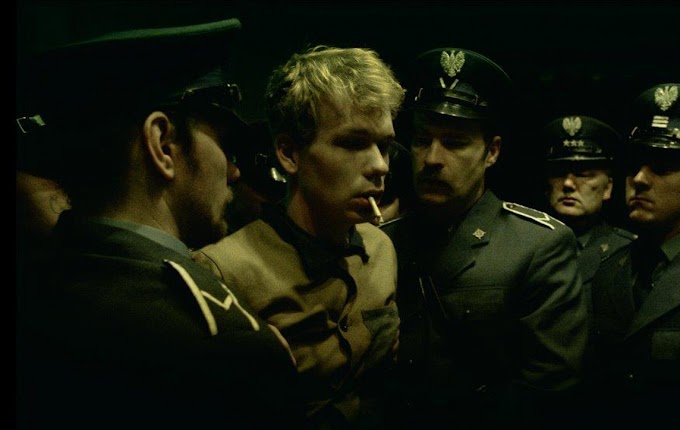Just as the heroine Weronika enjoys watching the world upside down,
through a star-studded bouncing ball, Véronique’s Double Life calls for a fresh
look at the world, open to it’s elusive poetry. The parallel story of Weronika
and Veronica escapes any rational explanation. Between Poland and France, a
strange bond unites the existence of these two women. Without knowing each
other, the presence of one unconsciously inhabits the spirit of the other, and
the echoes between their two lives multiply: Weronika is a young singer,
Véronique music teacher, each working in turn on the same song; symbol of the
invisible thread that connects them, a lace with which Weronika plays, is
received by Véronique in a mysterious letter…
The fusion of these two existences reached its peak during the untimely
death of Weronika, in the middle of a concert during which she sang the
enchanting song (composed by Zbigniew Preisner, but attributed in the film to
an imaginary eighteenth-century Dutch composer, Kieslowski thus playing even
more with the frontiers of truth) that both play. An incomprehensible feeling
of loneliness took hold of Veronica, recalling Weronika’s previous confession
that she had never felt alone.
Like this distant and fantastic link that intertwines the lives of the
two characters played by Irène Jacob (Cannes Film Festival Award for Best
Actress in 1991), the real seems to drift away, as Véronique’s entire
existence, now alone, revolves around games of mirrors, reminiscences of the
life of his missing double, and supernatural manifestations. Véronique begins a
second fantastic quest of another, linked to her by a strange and poetic link,
when she meets Alexandre, puppeteer. The motif of the double and the reflection
takes precedence once again from the indirect exchange of eyes in a mirror that
marks the meeting of the two characters. In the same way, the show that
Alexandre makes play with his puppet, staging, the tragic death of a ballerina
in the middle of his dance, and his rebirth under the features of a fairy,
largely echo the death of Weronika, and the magical flight of his soul to the top
of the concert hall, a few scenes earlier filmed by Kieslowski.
It is thus the fairy tale that guides the steps of Véronique in her
parallel search of a meaning to give to this presence that was in her, and of
Alexandre. Her journey is a sound. On the way back, throughout the film, of the
same low and captivating song, is added a strange audio cassette, recorded
various sounds. The noises of everyday life, taken out of their context, become
fantastic, and seem to have a hidden meaning. They constitute as many
mysterious clues, marking a path to the unknown direction, but which inevitably
attracts Veronica. Is it its double that awaits it at the end of this journey?
The discovery of another level of reality within which existences communicate?
or would she herself be a puppet, in the tale of her own life?
Providing an answer to these questions, or understanding what is the
nature of the link between Veronique and Weronika does not ultimately matter.
On the contrary, the film remains deliberately cryptic and plays on the
unexplained gleams, the images or the sounds of Weronika's life unexpectedly
interspersed with that of Veronique, to blur the boundaries between dream and
reality. The meaning, whatever it is, is all the more opaque.
It remains to the spectator only to leave behind reason, to get lost in
a film that is above all part of the poem. Its strength is perhaps above all to
bring forth the magic of moments of everyday life. The radiant face of Weronika
continuing to sing despite the beating rain, a rain of dust triggered by her
bouncing ball and under which she starts to dance, a glow that plays on the
walls of Veronique’s apartment like a will-o'-the-wisp, or the hands of a
puppeteer giving life to a dancer, so many elements seemingly so simple, but
which contain all the magic of a real rendered to his poetry and his intrinsic dreamlike.
If Véronique’s journey does not finally reveal any deep truth about the meaning
of the real, at least allows the spectator to rediscover that it is sometimes
enough to look at the distorted reflection of the world in a mirror or in a
starry bullet, to make it fascinating again, enchanting, and finding
unsuspected depth…




.png)

0 Comments